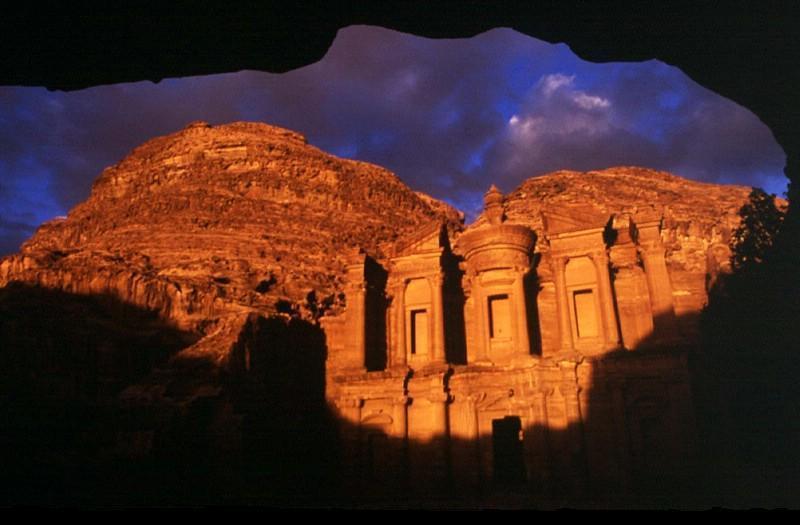|
petra
The ancient city of Petra is one of Jordan's
national treasures and by far its best known tourist attraction. Located
about three hours south of Amman, Petra is the legacy of the Nabatean,
an industrious Arab people who settled in southern Jordan more t han
2000 years ago. han
2000 years ago.
Admired then for its refined culture, massive architecture and ingenious
complex of dams and water channels, Petra is now a UNESCO world heritage
site that enchants visitors from all corners of the globe. Much of
Petra's appeal comes from its spectacular setting deep inside a narrow
desert gorge. The site is accessed by walking through a kilometer long
canyon (or siq), the walls of which soar 200 meters upwards. Petra's
most famous monument, the Treasury, appears dramatically at the end of
the siq. Used in the final sequence of the film "Indiana Jones and the
Last Crusade", the towering facade of the Treasury is only one of myriad
archaeological wonders to be explored at Petra.
Various walks and climbs reveal literally hundreds of buildings, tombs,
baths, funerary halls, temples, arched gateways, colonnaded streets and
haunting rock drawings - as well as a 3000 seat open air amphitheatre
circa,
a gigantic first century Monastery and a modern archaeological museum,
all of which can be explored at leisure. can be explored at leisure.
A modest shrine commemorating the death of Aaron, brother of Moses, was
built in the 13th century by the Mameluk Sultan, high on top of mount
Aaron in the Sharah range.
Petra was the meeting centre of the Nabatean spice routes, coming in
from the Persian Gulf, Western Arabia and the Red Sea. About 2000 years
ago Petra became the capital of the Nabatean Empire. Petra puts your
imagination to the test. Itís a mystic and glorious place, an eternal
tribute to a lost civilization. The natural richness of the mountains
area combines with the refined culture and massive architecture of the
Nabateans. The Nabateans carved their theatre, their temples, facades,
tombs, monasteries, houses and roads entirely into the natural rose-red
sandstone rocks. No wonder UNESCO placed Petra on its World Heritage List. You enter Petra by passing the deep and narrow
gorge called the Siq. Your efforts are rewarded by the dramatic sight of
the Treasury, the most famous monument in Petra. The Treasury is also
the stage of the final sequence of the film Indiana Jones and the Last
Crusade. But thatís ony the beginning. Various walks and climbs reveal
hundreds of buildings carved in stone and eroded through the centuries
into fabulous multi-colored walls. North of Amman you will find Jerash,
which is sometimes called the Pompeii of the East. Jerash was part of
the Roman Decapolis, the league of ten cities. Jerash is one of the best
preserved Roman towns outside Italy. Its colonnaded streets, baths,
theatres, plazas and arches remain in exceptional condition.
World Heritage List. You enter Petra by passing the deep and narrow
gorge called the Siq. Your efforts are rewarded by the dramatic sight of
the Treasury, the most famous monument in Petra. The Treasury is also
the stage of the final sequence of the film Indiana Jones and the Last
Crusade. But thatís ony the beginning. Various walks and climbs reveal
hundreds of buildings carved in stone and eroded through the centuries
into fabulous multi-colored walls. North of Amman you will find Jerash,
which is sometimes called the Pompeii of the East. Jerash was part of
the Roman Decapolis, the league of ten cities. Jerash is one of the best
preserved Roman towns outside Italy. Its colonnaded streets, baths,
theatres, plazas and arches remain in exceptional condition. |